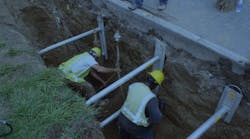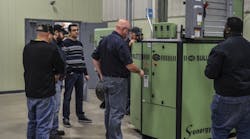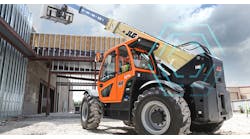Investment in Education and Mid-Sized Rental
Much has been written and spoken about the shortage of qualified labor on construction sites. The same problem is common in the equipment rental and distribution industries. It’s not easy to find qualified workers who want to do the kind of physical work that is required in this era when kids tend to grow up sitting in front of computer screens.
One company – Florida’s Sims Crane & Equipment, one of the largest and most successful crane rental companies in the U.S. – decided to take matters into its own hands and came up with a remarkable four-year program.
Sims developed a paid apprenticeship program to prepare graduates for long-term employment in the crane industry. Sims currently has about 80 apprentices enrolled in a robust, four-year statewide program to turn out crane operators, rigging professionals and transport truck drivers.
The apprentices enjoy full benefits and start at an hourly rate of $15 to $16 per hour. Most of the training occurs on the job and focuses safety, communications between operators and other workers, and equipment operation. After completing the program, crane operators can make $30 to $35 per hour.
Bob Berry, Sims Crane’s safety director and director of the apprenticeship program said the company is always looking for the right people who want to learn and develop their knowledge and skills before jumping into the seat of their own mobile crane.
Sims offers the program at 12 different Sims Crane locations around the state. Berry describes it as an ideal situation where an apprentice actually earns a paycheck while learning on the job. He points out that typically college students begin their careers in the working world already thousands or even hundreds of thousands of dollars in debt.
Each year emphasizes a specific discipline. The first year focuses on safety training, including OSHA regulations and general construction site safety. The second year goes into rigging and signaling. Year three focuses on crane setup and different types of lifting. The final year highlights key mental and judgement skills including safety and load calculations.
Even after graduating, Sims continues the education with training on new equipment and knowledge of the ongoing changes to rules and regulations. Berry regularly goes into the field to evaluate the program’s effectiveness, conduct safety audits and test operations.
Obviously not every equipment rental company can implement a program of this magnitude. I don’t expect a lot of rental companies to establish four-year education programs that are comparable to what a university or trade school could offer.
But a more modest commitment to training is certainly within reach of many companies. You may not be able to become Harvard University tomorrow but you can put some thought into what your company needs and how you can enhance the capabilities of your people.
* * *
Take a look at Industry News this month and you’ll see that sources of capital continue to regard the equipment rental industry as a good bet for investment with continued interest in the mid-sized segment. As we report in this edition, a couple of venerable mid-sized rental companies have attracted investment recently. When it comes to venerable, there aren’t many rental companies that meet that definition more than Washington Air Compressor Rental Co., known popular in the D.C. area as WashAir. Albert Stecklein founded this company in 1931, renting air compressors, and his grandson Stephen and three other Steckleins are still running it 86 years later, renting far more than air compressors.
Mississauga, Ontario-based Cooper Equipment Rentals was founded by CEO Darryl Cooper’s father back in 1972. Run as a single location for many years, the company has gained capital investment in recent years and become a national player in Canada, having made some major acquisitions, adding a trench shoring division and a few greenfields as well. With branches in Ontario, Quebec and now Alberta, Cooper Equipment Rentals and its strong leadership team has in a few years’ time become one of Canada’s leading rental players. You can expect to continue to hear more about CER in the near future.








